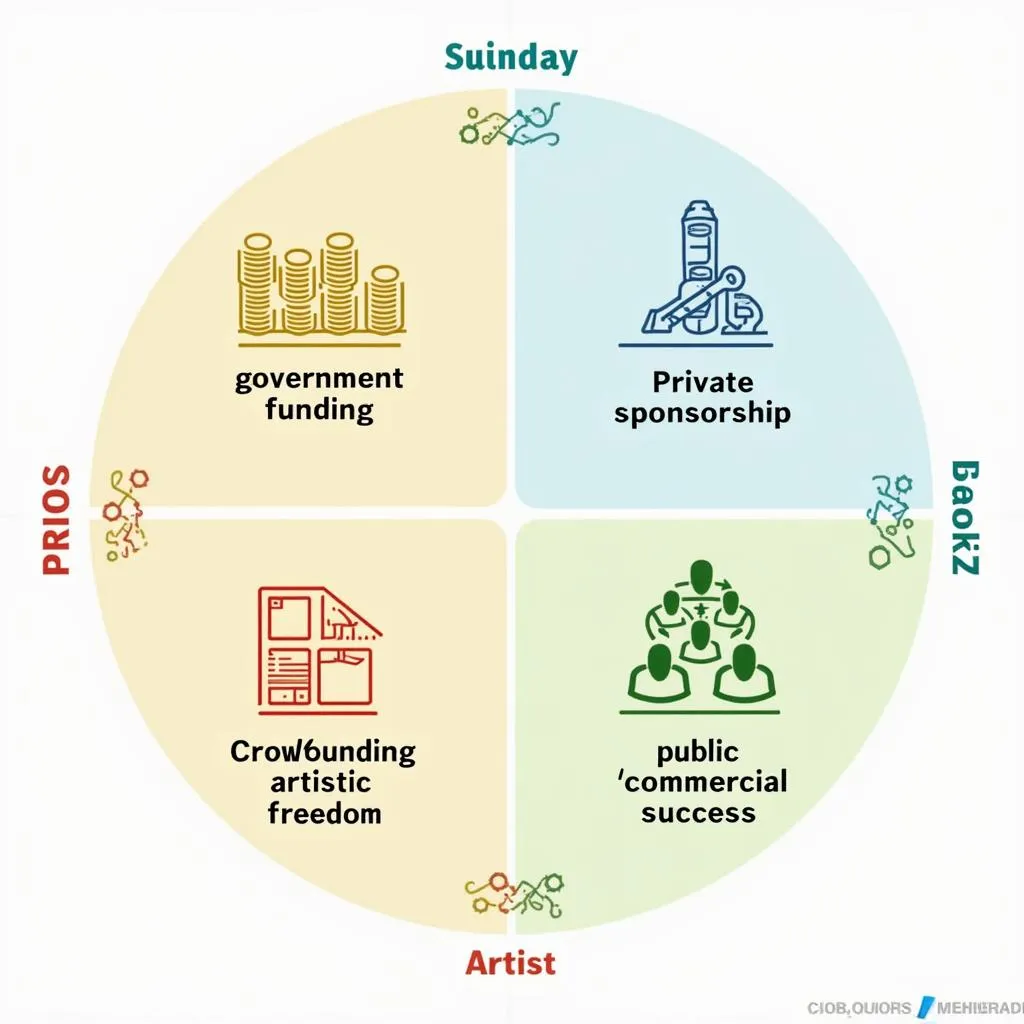The topic of government support for the film industry to preserve cultural identity is a recurring theme in IELTS Writing Task 2. Based on analysis of past exam questions, this subject has appeared multiple times and is likely to continue being a popular choice for future tests. Let’s explore a sample question that closely resembles those seen in actual IELTS exams:
Some people think that governments should give financial support to creative artists such as painters and musicians. Others believe that creative artists should be funded by alternative sources. Discuss both views and give your own opinion.
This question touches on the broader theme of government support for the arts, which includes the film industry. Let’s analyze the question and provide sample essays for different band scores.
Question Analysis
The question presents two contrasting views:
- Governments should provide financial support to creative artists.
- Creative artists should be funded by alternative sources.
To answer this question effectively, you need to:
- Discuss both viewpoints
- Provide reasons and examples for each view
- State your own opinion
- Use appropriate vocabulary and grammar structures
- Organize your essay coherently
Now, let’s look at sample essays for different band scores.
Sample Essay 1 (Band 8-9)
Creative artists, including painters and musicians, play a crucial role in shaping and preserving a nation’s cultural identity. The debate over whether governments should financially support these artists or if they should seek alternative funding sources is a complex one. This essay will examine both perspectives before presenting my own view on the matter.
Those who advocate for government funding argue that state support is essential for maintaining and promoting national culture. They contend that without financial assistance, many talented artists might struggle to pursue their craft, potentially leading to a loss of cultural heritage. Moreover, government backing can ensure that art remains accessible to all citizens, regardless of their economic status. For instance, subsidized concerts or exhibitions can make art available to a wider audience, fostering cultural appreciation and unity within society.
On the other hand, proponents of alternative funding sources argue that relying on government support may compromise artistic freedom and creativity. They believe that artists who depend on state funding might feel pressured to produce work that aligns with government agendas or popular opinion, potentially stifling innovation and authentic expression. Additionally, they argue that private sponsorship, crowdfunding, and commercial success can provide more diverse and sustainable funding options for artists. This approach could encourage artists to be more entrepreneurial and responsive to public tastes.
In my opinion, a balanced approach combining both government support and alternative funding sources would be most beneficial. While government funding can provide a safety net and ensure the preservation of cultural heritage, alternative sources can promote innovation and independence. This hybrid model could involve government grants for specific cultural preservation projects, alongside initiatives to encourage private investment in the arts. Such an approach would help maintain cultural identity while also fostering a dynamic and diverse artistic landscape.
In conclusion, both government support and alternative funding have their merits in supporting creative artists. A carefully balanced combination of the two can help preserve cultural identity while also encouraging artistic innovation and independence.
(Word count: 309)
 Government support for film industry to preserve cultural identity
Government support for film industry to preserve cultural identity
Sample Essay 2 (Band 6-7)
The question of whether governments should provide financial support to creative artists or if they should find other ways to get money is an important topic. This essay will discuss both sides of this issue and give my personal opinion.
Some people think that governments should give money to artists like painters and musicians. They believe this is important because art is a big part of a country’s culture. If the government doesn’t help, some artists might not be able to continue their work, and this could mean losing important parts of the culture. Also, when the government supports art, it can make it cheaper for people to see art exhibitions or concerts, which helps more people enjoy and learn about their culture.
However, other people think artists should find different ways to get money for their work. They say that if artists depend too much on government money, they might not be free to create what they really want. Instead, they might make art that the government likes, which isn’t always good for creativity. These people think that artists can get money from private companies, sell their art, or use things like crowdfunding on the internet. This way, artists can be more independent and maybe make art that more people like.
The importance of animal rights in modern society is another topic that often appears in IELTS essays, highlighting the need for diverse perspectives in societal discussions.
In my opinion, I think the best solution is to have both government support and other ways of getting money. The government can help with some money to make sure that important cultural art doesn’t disappear. But artists should also try to find other ways to support their work. This can help them be more creative and independent while still having some support from the government.
To conclude, both government support and other funding sources have good points for helping artists. I believe a mix of both is the best way to keep cultural art alive while also letting artists be creative and independent.
(Word count: 309)
Sample Essay 3 (Band 5-6)
There is a debate about whether governments should give money to artists or if artists should find other ways to get money. I will talk about both sides and give my opinion.
Some people think the government should give money to artists. This is because art is important for a country’s culture. If the government doesn’t help, some artists might stop making art. This could be bad for the country’s culture. Also, when the government helps, more people can see art because it’s cheaper.
But other people think artists should find different ways to get money. They say that if artists get money from the government, they might not make the art they really want to make. They might make art that the government likes instead. These people think artists can get money from companies or sell their art to people who like it.
Should zoos be banned for ethical reasons? is another topic that requires critical thinking, similar to the discussion on funding for the arts.
I think both ideas are good. The government can give some money to help keep important art alive. But artists should also try to find other ways to get money. This way, they can be more free to make the art they want.
In conclusion, I think the best way is to have both government help and other ways for artists to get money. This can help keep culture strong and let artists be creative.
(Word count: 218)
Explanation of Band Scores
Band 8-9 Essay:
- Fully addresses all parts of the task
- Presents a well-developed response to the question with relevant, extended and supported ideas
- Uses cohesion in such a way that it attracts no attention
- Uses a wide range of vocabulary with very natural and sophisticated control of lexical features
- Uses a wide range of structures with full flexibility and accuracy
Band 6-7 Essay:
- Addresses all parts of the task
- Presents a clear position throughout the response
- Arranges information and ideas coherently and there is a clear overall progression
- Uses a sufficient range of vocabulary to allow some flexibility and precision
- Uses a mix of simple and complex sentence forms
- May have some errors in grammar and vocabulary but they do not impede communication
Band 5-6 Essay:
- Addresses the task only partially; the format may be inappropriate in places
- Expresses a position but the development is not always clear and there may be no conclusions drawn
- Presents information with some organisation but there may be a lack of overall progression
- Uses adequate range of vocabulary for the task
- Uses a limited range of structures
- Has frequent errors that may cause some difficulty for the reader
Key Vocabulary to Remember
-
Creative artists (noun): People who create art, such as painters, musicians, or writers.
Pronunciation: /kriˈeɪtɪv ˈɑːrtɪsts/ -
Cultural identity (noun phrase): The identity of a group or culture, or of an individual as far as one is influenced by one’s belonging to a group or culture.
Pronunciation: /ˈkʌltʃərəl aɪˈdentəti/ -
Subsidize (verb): To support financially.
Pronunciation: /ˈsʌbsɪdaɪz/ -
Alternative funding (noun phrase): Different ways of getting financial support, not from traditional sources like the government.
Pronunciation: /ɔːlˈtɜːrnətɪv ˈfʌndɪŋ/ -
Preservation (noun): The act of keeping something as it is, especially in order to prevent it from decaying or being damaged or destroyed.
Pronunciation: /ˌprezərˈveɪʃən/ -
Stifle (verb): To prevent something from happening, developing, or making progress.
Pronunciation: /ˈstaɪfəl/ -
Entrepreneurial (adjective): Having the qualities of an entrepreneur; showing initiative and willingness to take risks in business.
Pronunciation: /ˌɒntrəprəˈnɜːriəl/ -
Hybrid model (noun phrase): A combination of different systems or approaches.
Pronunciation: /ˈhaɪbrɪd ˈmɒdl/ -
Innovation (noun): The introduction of new ideas, methods, or things.
Pronunciation: /ˌɪnəˈveɪʃən/ -
Diverse (adjective): Showing a great deal of variety; very different.
Pronunciation: /daɪˈvɜːrs/
 Comparison of artist funding sources
Comparison of artist funding sources
Conclusion
The topic of government support for the arts, including the film industry, to preserve cultural identity is a complex and recurring theme in IELTS Writing Task 2. By examining sample essays across different band scores, we can see how the depth of analysis, language use, and essay structure contribute to achieving higher scores.
For future practice, consider exploring related topics such as:
- The role of traditional art forms in modern society
- The impact of globalization on local cultures
- The balance between cultural preservation and progress
- The economic benefits of a thriving arts sector
To improve your writing skills, try composing your own essay on this topic and share it in the comments section below. This active practice will help you refine your ideas and writing technique, preparing you for success in the IELTS Writing Task 2.


